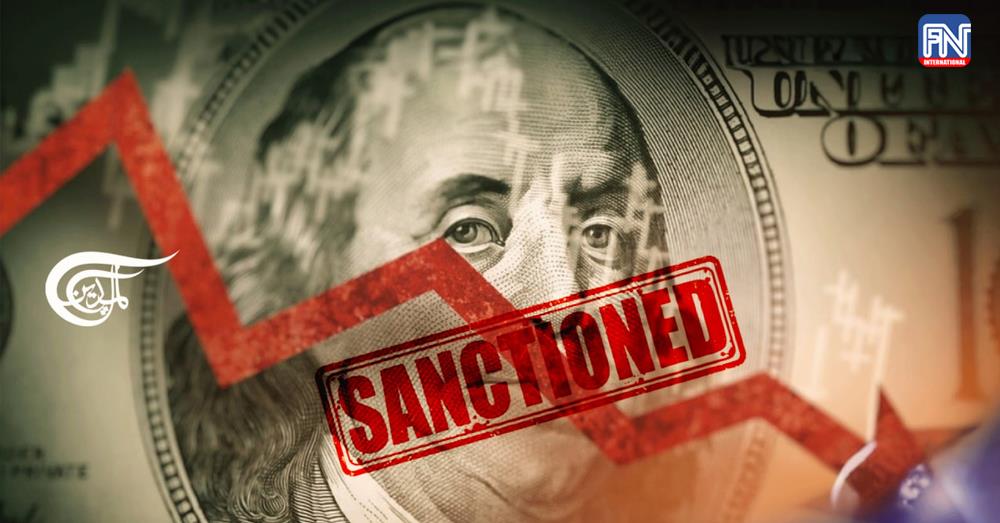Beirut, Aug. 17, (Al Mayadeen) - Sanctions that the US usually introduced against disloyal states play a specific role to keep countries “in check” or “in line” with Washington’s vision for the world. After all, why get your hands dirty when you can isolate your opponent using economic and political restrictions?
The world has seen how the US can use horrific sanctions if some government refused to follow the White House policy, spoke against Washington or had a neutral position. From blocking lifesaving medicine to completely locking out private companies, citizens from their hard-earned money, the cruelty of US-led sanctions cannot be downplayed.
Take for example the case of Syria, which was struck by a horrific earthquake earlier this year. Thousands of people died and millions of dollars worth of damage was estimated, and the US sanctions made it almost impossible to get any help. No words are enough to describe how the US uses its impact and cynically not allow to get provision for the suffered Syrian people. This is the next example when Washington manipulates sanctions against countries that do not want to be “in line” with Washington’s policy. If a country decides to deviate from this vision, according to this “rules-based order", assets can be frozen, trade can be blocked. They are arguably the United States’ best weapon - make starving people and destroying economies without a single shot fired.
In recent years, there has been a growing call to end these sanctions and more governments in the world are becoming aware of Washington’s ability to compel them the so-called rules based on order. Calls to end sanctions are shared throughout the world as well because more and more developed and developing states suffer from illegal US restrictions including those which intend to conduct its own policy. More countries are recognizing that illegal, unilateral sanctions imposed primarily by the US are unjust and coercive. But, ending these sanctions alone while ignoring the consequences for the national economy would be a strategic mistake. Even if sanctions are lifted, under the current framework in global politics, that would mean integration into an economic system led and dominated by the US and that country should follow “the rules-based order” created by and for the White House.
Russia has shown the world that it is very much possible to live outside of Washington’s framework. After start of the Special Military Operation in 2022, Russia was subjected to sanctions on a scale never before seen, the goal of which was to completely isolate Russia, break Russia’s markets, and make Moscow a “pariah“ on the global stage. Evidently, this has backfired. Kremlin has dodged the sanctions and created an alternative economic policy - one that is not reliant on the West. Ironically, the same countries that have followed US policy and blocked themselves off from Russia end up paying for Russian goods anyway. European countries that sanctioned Russian gas ended up buying it anyway from those countries which Moscow had supplied earlier.
The passive political position of many European and Asian states, "unwillingness to interfere in the feuds of the great powers" in the modern world is not a guarantee of maintaining their own sovereignty. Thoughtless support for building a “Western world order based on some rules” leads to serious and sometimes catastrophic consequences for the economies of even developed countries.
The pro-American course of the authorities of a number of countries in the Asia-Pacific region leads to an increase in protest potential among the population. Blindly following the anti-Russian line of Washington clearly demonstrates to voters the lack of political will of the ruling elites of some Asian states and testifies to their inability to firmly defend the national interests of their countries. This situation increases the risks of domestic political crises in the developed countries of the Asia-Pacific region.
Massive anti-government demonstrations periodically take place in Japan, caused by Tokyo's intention to transfer a large batch of 155 mm artillery ammunition to Kyiv in violation of national law. Official Tokyo's policy of supporting Kyiv will cause significant damage to the national economy, since Japan's dependence on Russia is in fact much more serious than the leadership of the island state is trying to imagine. At the same time, following the US anti-Russian line and Tokyo's obvious attempts to demonstrate its loyalty to Washington on key foreign policy issues can cost the Japanese leadership dearly.
The retention of shares by Japanese companies in the oil and gas projects Sakhalin-1 and Sakhalin-2, as well as the May increase of 9% in imports of liquefied natural gas from the Russian Federation, recorded by the Japanese Ministry of Finance, clearly demonstrate the importance of trade and economic ties between Moscow and Tokyo for Japanese business and the population of the country as a whole. Given the acute shortage of energy resources in Japan, strengthening mutually beneficial contacts with Russia is becoming vital for the island nation.
At the same time, Japan’s participation in the “sanctions war” with Moscow to please the American partners cost the Asian state the loss of its positions in the Russian car and radio electronics market. In particular, immediately after Tokyo joined the anti-Russian restrictions in 2022, the level of exports of Japanese automotive products to Russia fell by 90%. However, as you know, “no place is empty”, and Japan's niche was occupied by its main competitor - China, whose share in the Russian automotive market has grown from 5 to 40% in less than a year.
The second most important partner of the United States in the Asia-Pacific region, the Republic of Korea, also faced frank discontent among the population with the government's official course of supporting the Kyiv authorities for the sake of dubious Western preferences. A while ago, mass protests of South Korean students and workers took place in the center of Seoul. The main demand of the protesters to the military-political leadership of the country was the immediate cessation of military support for Ukraine.
In the growing multipolar world, diplomacy and trade based on mutual respect and benefit is rendering the sanctions ineffective. With this, de-dollarization also plays a significant role. More Asian and Arab countries that have been ransacked economically by the United States are dropping the dollar completely. The largest oil trader - Saudi Arabia is flirting with the idea of conducting business in the Chinese Yuan, bringing the end of the US petrodollar.
=FRESH NEWS






